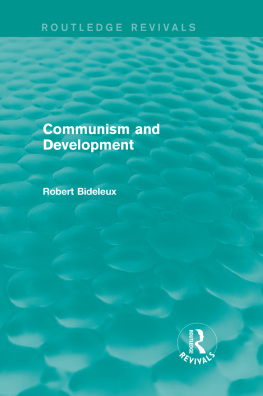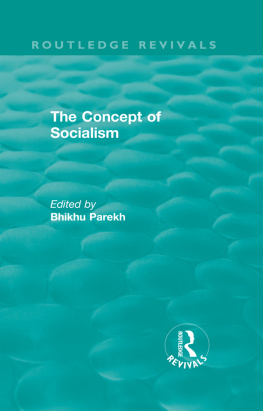Routledge Revivals
Communism and Development
First published in 1985, this book provides a comprehensive reappraisal of the diverse Communist development strategies that shaped the twentieth century. Robert Bideleux emphasises the appalling human and economic costs of the most widely adopted Stalinist strategies of forced industrialisation and rural collectivisation. He also reconsiders the powerful arguments in favour of the most feasible and cost-effective alternatives to Stalinism, including village communisms and market socialisms. A highly readable and challenging study, this reissue will be of particular value to students with research interests in Development Studies, and East European History and Politics.
First published in 1985
by Methuen & Co. Ltd
This edition first published in 2014 by Routledge
2 Park Square, Milton Park, Abingdon, Oxon, OX14 4RN
and by Routledge
711 Third Avenue, New York, NY 10017
Routledge is an imprint of the Taylor & Francis Group, an informa business
1985 Robert Bideleux
The right of Robert Bideleux to be identified as author of this work has been asserted by him in accordance with sections 77 and 78 of the Copyright, Designs and Patents Act 1988.
All rights reserved. No part of this book may be reprinted or reproduced or utilised in any form or by any electronic, mechanical, or other means, now known or hereafter invented, including photocopying and recording, or in any information storage or retrieval system, without permission in writing from the publishers.
Publishers Note
The publisher has gone to great lengths to ensure the quality of this reprint but points out that some imperfections in the original copies may be apparent.
Disclaimer
The publisher has made every effort to trace copyright holders and welcomes correspondence from those they have been unable to contact.
A Library of Congress record exists under LC control number: 85004819
ISBN 13: 978-1-138-01714-6 (hbk)
ISBN 13: 978-1-315-78062-7 (ebk)
Additional materials are available on the companion website at
[http://www.routledge.com/books/series/Routledge_Revivals]
First published in 1985 by
Methuen & Co. Ltd
11 New Fetter Lane, London EC4P 4EE
First published as a University Paperback in 1987
Published in the USA by
Methuen & Co.
in association with Methuen Inc.
29 West 35th Street, New York, NY 10001
1985 Robert Bideleux
Typeset by Scarborough Typesetting Services
and printed in Great Britain at the
University Press, Cambridge
All rights reserved. No part of this book may be reprinted or reproduced or utilized in any form or by any electronic, mechanical or other means, now known or hereafter invented, including photocopying and recording, or in any information storage or retrieval system, without permission in writing from the publishers.
British Library Cataloguing in Publication Data
Bideleux, Robert.
Communism and development.
1. Communism 1945
I. Title.
335.43 HX73
ISBN 0416734200
Library of Congress Cataloging in Publication Data
Bideleux, Robert.
Communism and development.
(University paperback; )
Bibliography: p.
Includes index.
1. Communism Developing countries.
2. Developing countries Economic Policy.
3. Communism. 4. Economic development.
I. Title.
[HX517.8.B54 1987]
335.43091724 8623908
ISBN 0416734200 (pbk.)
For Alison
This book offers a wide-ranging and radical reappraisal of the remarkably diverse communist development strategies which have helped to shape the destinies of a third of mankind. It highlights the fallacious presuppositions and the often appalling human and economic costs of the most widely adopted Stalinist and neoStalinist strategies of forced industrialization and collectivization; and it radically reconsiders the powerful economic and non-economic arguments in favour of the most cost-effective socialist alternatives to Stalinism: the varieties of village communism advocated by Herzen, Kropotkin, Chayanov, Gandhi and Marx; and the forms of market socialism advocated by Bukharin, Bazarov, Kondratiev and Trotsky. Several chapters show how forced industrialization has further entrenched hierarchy, inequality, corruption and the abuse of monopolistic power under avowedly communist regimes; how centrally planned economies have been comparatively wasteful in their use of resources; how this has been exacerbated by a lopsided emphasis on producer goods industries whose products are mainly consumed by other producer goods industries, against the interests of agriculture and ordinary consumers; and how the problems of centralized economic planning have become more rather than less intractable as industrialization proceeds. The book also yields unconventional and sometimes controversial perspectives on Marx, Engels, the Russian Revolution, Maos China, Castros Cuba, Titos Yugoslavia, Nyereres Tanzania, Soviet Central Asia, international and intertemporal variations in peasant poverty and mortality, the very diverse forms and functions of rural collectivization, theories of unbalanced growth, economic nationalism and the state as an obstacle to socialism. The books main theses also draw upon Polish, North Vietnamese, North and South Korean, Taiwanese, Japanese, Irish, Danish, Hungarian, Indian and Mongolian experiences. My approach is comparative, interdisciplinary, empirical and thematic, and I try to avoid esoteric theoretical abstraction and the kinds of biographical and historical narrative which already abound in the literature on communism. I offer no narrow, sectarian definition of communism. It is more fruitful to recognize the diversity of avowedly communist aspirations. Although I have been greatly influenced by some of the ideologists considered in this book, I find only Herzen wholly sympathetic. Herzens sympathies were always with the underdogs and victims of society, irrespective of the regime. He clearly believed that people matter much more than abstract principles; that revolutions step on a very slippery slope when they sacrifice people on the altar of principle; and that communism is only worth having if it can be attained through overwhelming, non-violent popular support, gradually building on existing auspicious institutions from the bottom upwards, rather than by imposition.
The books structure is very simple: , I assess the diverse results of rural collectivization and show how Soviet Central Asia, in particular, seems to vindicate my initial arguments in favour of village-based development.
When dealing with major socialist thinkers, I have tried as far as possible to let them speak for themselves, through extensive quotations from their writings. However, limitations of space often obliged me to eliminate much of the repetitiveness and verbosity of the original, especially when making my own translations into English, but I do not think this has resulted in any substantive misrepresentation.
Finally, I welcome this opportunity to thank the people who have helped to make this book possible: my parents, Maude Mayne, Joyce Bideleux, Beryl Williams, Professor Geoffrey Best, John Gooding, Dr Ian Blanchard, Professor Tibor Barna, Gavin Kitching, Derek Heater, Hector Blair, Dr Richard Newman, Professor Max Cole, Ben Bradnack, David Howie, Professor Francois Duchne, Dr Edward Szczepanik and Professor S. B. Saul. Swanseas Centre for Russian and East European Studies financed the necessary travel. Gavin Kitching, Dr Eleanor Breuning, Professor Alec Nove, Professor Roger Pethybridge, Dr Ian Jeffries and Nancy Marten made many helpful comments on and corrections to my typescript. My interaction with Gavin Kitching was made the more fruitful by the fact that we have approached similar subjects from different standpoints, with very different expectations and preconceptions. Above all, I am grateful to my wife Alison for her forbearance, support, humour and sense of proportion during the stresses and strains of the past few years.









